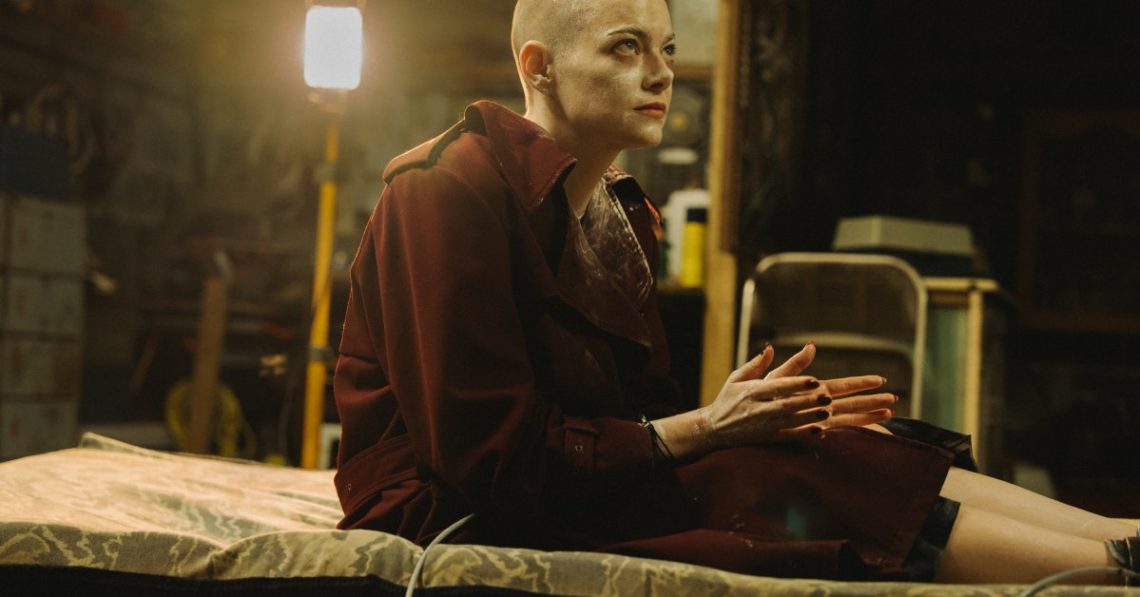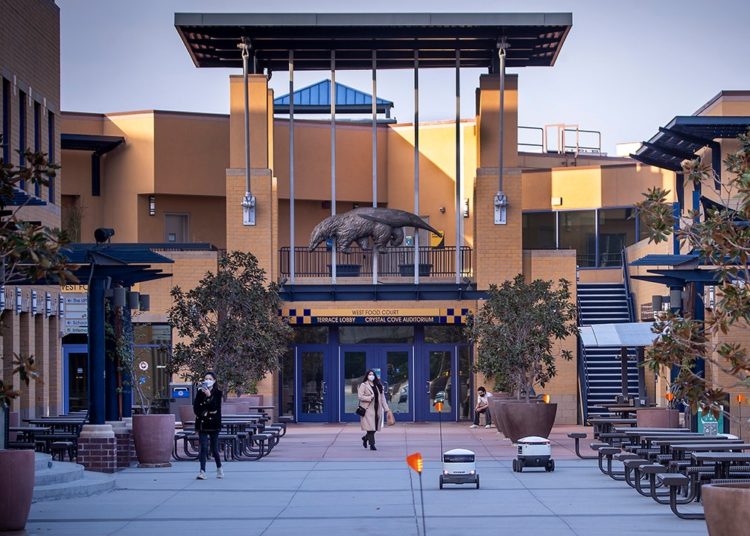Warning: This post contains spoilers for Bugonia.
If you’re wondering how the title Bugonia connects to a movie about two conspiracy theorists who kidnap the head of a major pharmaceutical company, believing she’s a member of an invasive alien species, it all comes back to the bees.
In the new black comedy thriller from director Yorgos Lanthimos (Poor Things, The Favourite), now in theaters, amateur beekeeper Teddy Gatz (Jesse Plemons) is convinced his honey bee hives are falling victim to Colony Collapse Disorder—a phenomenon in which worker bees mysteriously disappear, leaving the queen behind and the colony doomed—as a result of chemicals manufactured by Auxolith, the megacorporation run by high-powered CEO Michelle Fuller (Emma Stone). Teddy also works for Auxolith as a low-level warehouse employee and has a dark history with the company, which, years prior, put his mother Sandy (Alicia Silverstone) on an experimental drug treatment for opioid withdrawal that left her in a persistent vegetative state. This sent Teddy down a rabbit hole of Internet conspiracy theories that ultimately led to him latching onto the idea that Michelle is an alien-in-disguise from the Andromeda galaxy who was sent to Earth as part of a plot to wipe out humanity. One phase of the Andromedans’ plan, according to Teddy? Kill off all the bees.
Now, back to how “Bugonia” ties into all this. The title is an ancient Greek word meaning “progeny from an ox” that refers to a ritual that sprang from the myth that bees could spontaneously generate from the carcass of an ox killed without any blood being spilled, a means of sacrifice that generally resulted in prolonged suffering for the animal. In addition to the ambiguous nature of the largely unknown word appealing to Bugonia‘s filmmakers, screenwriter Will Tracy (The Menu, Succession) told Independent TV the title can also be read as a figurative nod to the overall message of the movie, which is based on South Korean filmmaker Jang Joon Hwan’s 2003 sci-fi cult classic Save the Green Planet!.
“You could take that as a metaphor for contemporary, certainly American life, or human civilization, if you wish,” he said. “That there might be some opportunity or new life that could arise from the ashes of something that’s quite corrupt. That’s one way to look at it.”
Of course, the full extent of how that metaphor applies to Bugonia isn’t revealed until the film’s final minutes, when the truth about Michelle’s extraterrestrial origins at long last come to light.
Is Michelle an alien?
After Teddy’s docile yet easily manipulable cousin Don (Aidan Delbis) blows his head off with a shotgun in front of Michelle in response to his inability to reconcile his loyalty to Teddy with the guilt he feels over her kidnapping and torture, Michelle convinces an anguished Teddy that she’s been keeping the Andromedan cure for his mom’s condition hidden inside an antifreeze bottle in the trunk of her car. This results in a predictably dread-inducing sequence in which Teddy rushes to his mother’s long-term care facility and feeds antifreeze into her IV line, killing her.
Meanwhile, Michelle, who manages to fish the keys to her chains out of a deceased Don’s pocket, has the opportunity to escape her captivity. However, after she discovers a secret room in Teddy’s basement filled with the remains of his previous test subjects-turned-victims, she decides to remain behind.
When Teddy returns, she confronts him over his experiments on and knowledge of the Andromedans and confesses the history of her alien race, claiming they arrived on Earth at the time of the dinosaurs and accidentally caused that species’ extinction, so created a new species in their own image to repopulate the planet. Michelle spins a long and complicated tale, but insists Teddy was wrong about the Andromedans trying to infiltrate and poison humanity. Instead, she says, humans are destroying the Earth, its animals, and themselves all on their own with climate change, war, and countless other evils. The Andromedans have been desperately working to try to find a way to save humanity from itself, according to Michelle. However, at this point in the movie, it’s still unclear whether she is telling Teddy the truth or simply, to put it bluntly, f-ing with him.
Read More: Yorgos Lanthimos’ Bugonia Is Punishing, But Emma Stone Can Do No Wrong
How does Bugonia end?
With the lunar eclipse set to take place that night, Michelle says she will bring Teddy with her to her mothership by transporting him to space via the teleportation closet in her office. However, when they arrive at Auxolith, Teddy lets on that he’s wearing a bomb vest as a contingency plan. Michelle says she will teleport him first, typing a ridiculously long number into a calculator in what seems like a desperate ploy to buy herself time. But once he enters the closet, his vest detonates, blowing him to pieces and knocking Michelle out. She later comes to in an ambulance and rushes to escape and get back to Auxolith. Back in the closet, she actually does beam herself up to her mothership using the calculator, and it’s revealed she is the Andromedans’ empress. Teddy, as it turns out, was right about many of the minute details concerning the Andromedans—from their hair functioning as their means of communication to the exact design of their spacecraft.
Following a council with her Andromedan advisors, Michelle ultimately comes to the conclusion that humanity is a failed experiment and pops a bubble surrounding a model of Earth that causes every single person on the planet to instantly—and bloodlessly—drop dead. Bugonia then ends with an extended montage set to Marlene Dietrich’s version of “Where Have All the Flowers Gone?” showing corpses all around the world strewn wherever they fell at the exact moment the bubble popped. However, it’s clear hope for Earth itself remains, as the bees are shown returning to their hives. It’s a finale that’s intended to hit viewers particularly hard at this moment in human history, according to Tracy.
“The ending of Bugonia is reckoning a little bit more with a very specific kind of political turn and hopelessness that we’re feeling at the moment,” he told Inverse. “[A]s time has gone on and the climate catastrophe has felt increasingly urgent, and for some people hopeless, that feeling of our relation to the planet and our trying to prefigure what the planet might look like without us and what our role is on this planet, I think all those questions feel much more top of mind.”
The post Breaking Down the Comically Bleak Ending of Yorgos Lanthimos’ Bugonia appeared first on TIME.




